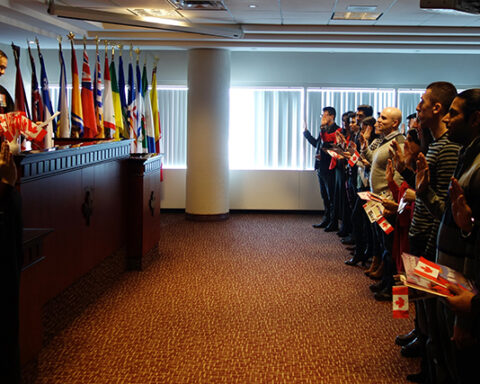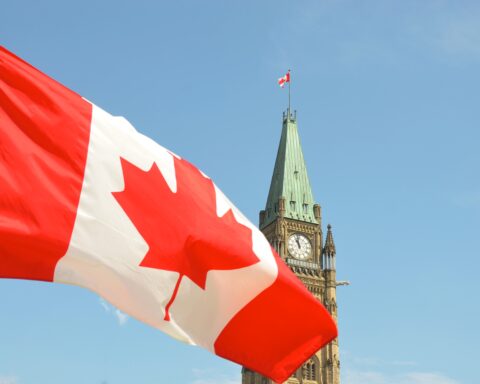It might be an awkward time to remind Conservatives of this, but the current government has two different standards for when one can wear a niqab — one for citizenship ceremonies, one for voting.
It is definitely not OK — “offensive” even — for people to wear face coverings at citizenship ceremonies, Conservatives swiftly declared after an important court ruling cleared the way for that practice this week.
Voting, apparently, is a different matter. Despite all of their condemnations of veiled voting several years ago — and all the other sweeping changes in the 2014 Fair Elections Act making it tougher to vote — somehow Conservatives never did get around to banning face coverings at the ballot box.
That’s right. The same face coverings that are “offensive” in citizenship ceremonies are allowed in the voting booth, according to the Conservative government’s own laws … or lack of them.
So Zunera Ishaq, the 29-year-old woman who went to Federal Court to win the right to cover her face during a citizenship ceremony, didn’t have to go to court for the same right at the voting booth. She already had that right, as soon as she had Canadian citizenship.
Odder still, in Ishaq’s court case, a lawyer for the Justice Department testified that it was never the government’s intention to make it mandatory for women to remove face coverings at citizenship ceremonies.
Elections Canada has a procedure in place for any voters who want to cast a ballot while wearing face coverings on Oct. 19. Here’s how it described that procedure in an advisory sent out late last year after the Fair Elections Act became law:
If an elector wearing a face covering comes to vote, the deputy returning officer will ask the elector to show their face. If the elector agrees to remove their face covering, the election officer will follow regular voting procedures. Election officers have been instructed to exercise respect and sensitivity in following this administrative procedure. If the elector does not wish to remove their face covering, the deputy returning officer will advise the elector that they must provide two pieces of authorized identification, one proving their identity and the other proving their identity and address, and then take an oath attesting to their eligibility to vote. If the elector agrees to provide the identification and take the oath, the election officer will follow regular voting procedures.
It’s not like the government forgot to ban veiled voting in the Fair Elections Act. When a Commons committee was reviewing the bill in early 2014, Bloc MP André Bellavance specifically asked why the prohibition wasn’t in the bill. Two cabinet ministers, Jason Kenney and Pierre Poilievre, said they were open to amendments on that score.
The amendments never materialized.
Odder still, in Ishaq’s court case, a lawyer for the Justice Department testified that it was never the government’s intention to make it mandatory for women to remove face coverings at citizenship ceremonies.
What we have here is a textbook case of saying one thing and doing another in politics. The ‘saying’ part is for all the wrong reasons — the ‘doing’ part is for the right ones.
Sending dog-whistle signals
I suspect the Conservative government realized several years ago that it was legally impossible to ban veiled voting. Two attempts were made between 2007 and 2011. Both quietly died on the order paper.
Here’s why: It would amount to singling out certain members of the population for restricted rights. We do allow people to vote in Canada without showing their face at the ballot box — through proxies, or mail-in special ballots. How do you write a law that says some people don’t need to show their faces, but others do?
[T]he Conservatives took the path of blustering about niqabs and sending dog-whistle signals to people uncomfortable or fearful about Muslims. Bad statesmanship. Easy politics, though.
Moreover, a special law to prohibit the niqab would stomp all over Canadians’ rights to religious expression. That’s probably why the Justice Department lawyer felt he had to point out the non-mandatory aspect of the legislation in Federal Court.
Rather than explain this to Canadians, though, the Conservatives took the path of blustering about niqabs and sending dog-whistle signals to people uncomfortable or fearful about Muslims. Bad statesmanship. Easy politics, though.
We saw that earlier this year, as well, when the Conservatives sent out a fundraising e-mail asking supporters to sign up if they agreed that it was “offensive” to wear a niqab or a hijab at citizenship ceremonies. The e-mail left little doubt that the Conservatives were whipping up these sentiments for reasons of purest electoral politics.
The note was signed by Immigration Minister Chris Alexander and stirred up some controversy with his interchangeable use of ‘niqab’ and ‘hijab’; one is generally associated with full-face coverings, while the other, the hijab, is commonly used to describe a head covering.
To make things even more confusing, not all Conservatives have been using the word “offensive” when it comes to garments of religious expression. Kenney, for instance, said on Twitter in 2013: “A child is no less Canadian because she or he wears a kippa, turban, cross, or hijab to school.” Kenney sent out that missive in the midst of the Quebec debate over the wearing of religious symbols in public.
There’s still a month left in this election and it’s entirely possible that one of the eleventh-hour Conservative campaign promises will revolve around banning veiled voting — again. It would fit well with this week’s bluster on citizenship ceremonies.
This time we might ask them: Why did the last two attempts quietly die? Are they serious this time, or is this just another attempt to whip up some good old-fashioned intolerance?
What’s really being veiled here by all this talk about the niqab?
Susan Delacourt is one of Canada’s best-known political journalists. Over her long career she has worked at some of the top newsrooms in the country, from the Toronto Star and The Globe and Mail to the Ottawa Citizen and the National Post. She is a frequent political panelist on CBC Radio and CTV. Author of four books, her latest — Shopping For Votes — was a finalist for the prestigious Hilary Weston Writers’ Trust Prize for Canadian non-fiction in 2014. She teaches classes in journalism and political communication at Carleton University.
Published in partnership with iPolitics.ca.





